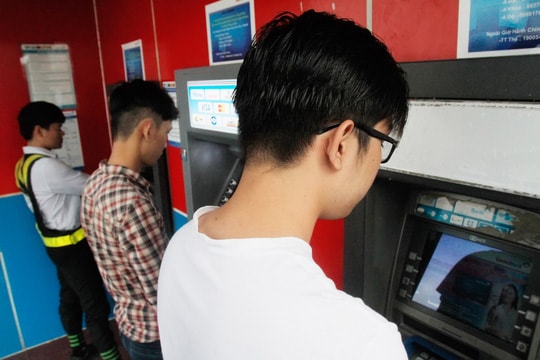Tens of millions of ATM cards must be converted
All domestic debit cards (ATMs) issued by Vietnamese commercial banks will have to convert from magnetic cards to chip cards according to the State Bank's project.
According to the State Bank (SBV), the conversion of all bank cards of all types (mainly ATM cards) from magnetic cards to chip cards (electronic microchips) is to prevent the increasing fraud and counterfeiting, contributing to reducing risks and losses for all parties in transactions. Commercial banks only have about 5 years to convert tens of millions of issued ATM cards. The latest statistics show that the whole country has more than 90 million cards of all types. Of which, ATM cards are more than 80 million, the rest are credit cards, prepaid cards...
Strengthening crime prevention
In a recent document sent to commercial banks, the State Bank requested an urgent conversion to chip cards for all ATM cards according to the plan issued at the end of last year. The conversion to chip cards is one of the solutions to strengthen the prevention of card crimes because, according to the State Bank, the situation of card crimes has recently tended to increase and become more complicated (theft of card information, making fake cards to withdraw money at the ATM system, etc.).
 |
| ATM cards are mainly used to withdraw cash. Photo: Hoang Trieu |
This conversion project is carried out by the National Payment Corporation of Vietnam (NAPAS) under the direction of the State Bank and the coordination of commercial banks. NAPAS is the new brand of Banknetvn (Vietnam National Financial Switching Corporation) after merging with Smartlink Card Services Corporation. Mr. Pham Tien Dung, Chairman of the Board of Directors of NAPAS, said that along with the goal of converting magnetic cards to chip cards by 2020, domestic cards across the market will carry the national card brand NAPAS and the larger goal is to take on the main payment role, not just cash withdrawals as in the past.
According to Mr. Cu Anh Tuan, General Director of An Binh Commercial Joint Stock Bank (ABBANK), initially, a group of 5 commercial banks will develop a project to build a separate domestic card brand for Vietnam using chip card technology, replacing all magnetic cards currently in use. The banks are piloting before deploying the entire system. If the State Bank does not require it, each bank must also convert due to card security and chip cards can serve customers better.
A representative of Saigon Commercial Joint Stock Bank (SCB) said that by the end of March 2016, the bank had issued nearly 240,000 cards of all kinds and was ready to convert magnetic cards to chip cards according to the State Bank's planned roadmap. In the coming time, SCB will work with all commercial banks, the State Bank and related units to develop and unify a set of domestic chip card standards. It is expected that this set of standards will be issued in 2017. Next, SCB will adjust and upgrade its issuance and payment system and then proceed to convert cards for customers. This process takes 12-18 months and SCB can complete it before 2020.
Are cardholders affected?
The conversion from magnetic cards to chip cards involves upgrading system software, card acceptance devices and some other components. To issue chip cards, a representative of Ho Chi Minh City Development Joint Stock Commercial Bank (HDBank) said that the most important thing is the "chip standard", but this standard has not yet been announced. Once there is a common standard, banks can implement the conversion.
“Compared to magnetic cards, chip cards have higher security. For example, with magnetic cards, copying information is quite easy. As for chip cards, with a structure like a miniature computer, it is very difficult to access and steal data. Chip cards also allow the integration of many more features and applications to serve many other diverse services” - SCB representative compared.
According to card managers of some banks, the conversion process does not affect customers' card usage. All cardholder data will be kept intact by the bank during the conversion. During the implementation process, customer transactions will be processed normally because the bank will maintain both magnetic and chip systems in parallel for a certain period of time to ensure stability and correct any errors that may arise (if any). Banks also set aside a period of time for customers to gradually switch to using chip cards.
“The only fee that customers may have to pay is the cost of issuing a chip card because the price of the card blank is many times higher than that of a magnetic card blank. However, the bank will also have a support policy for each subject so that customers can spend the cost at the most reasonable level,” said an SCB representative.
An officer with experience in the field of bank cards commented that the policy of converting all ATM cards to chip cards is in line with the trend of modern and safe technology. The value of each chip card blank is about 1-1.5 USD depending on the capacity (equivalent to 23,000-35,000 VND), while the magnetic card blank is only about 3,000-4,000 VND/card. If we temporarily calculate about 60% of ATM cards on the market are still active (the rest are junk cards, "dead" cards), the number of cards that need to be converted is about 50-55 million, which is a huge expense for the banking system, in addition to the investment cost to upgrade the system.
The roadmap set by the State Bank is to complete the conversion of all domestic cards by 2020. If the conversion is too fast, the burden will fall on banks and may be transferred to customers, while chip card suppliers will benefit greatly.
According to Laborer
| RELATED NEWS |
|---|


